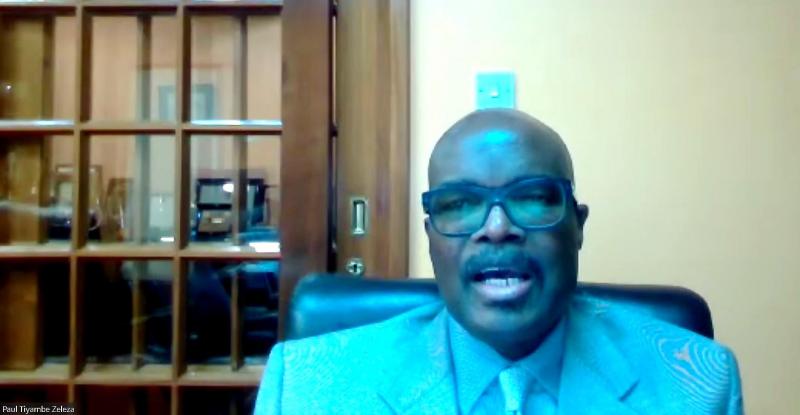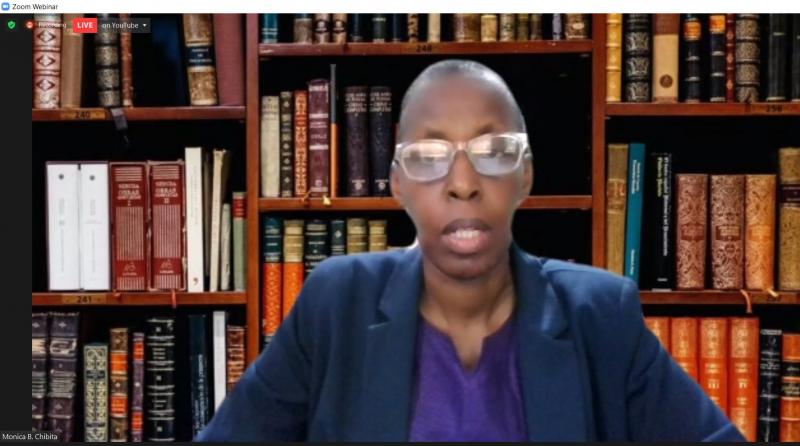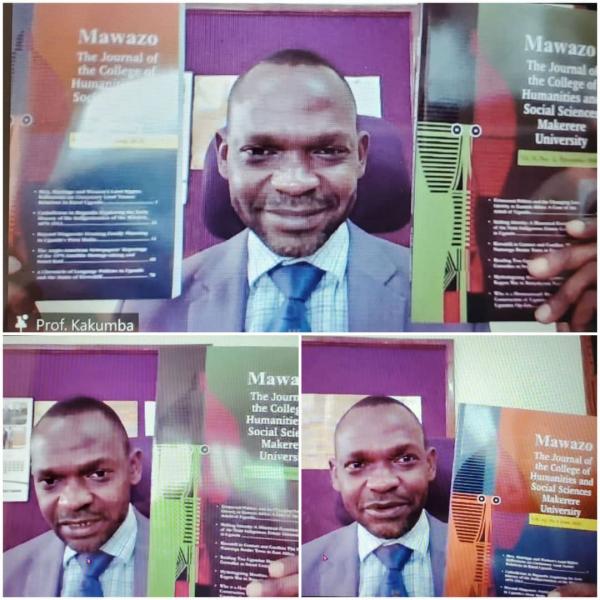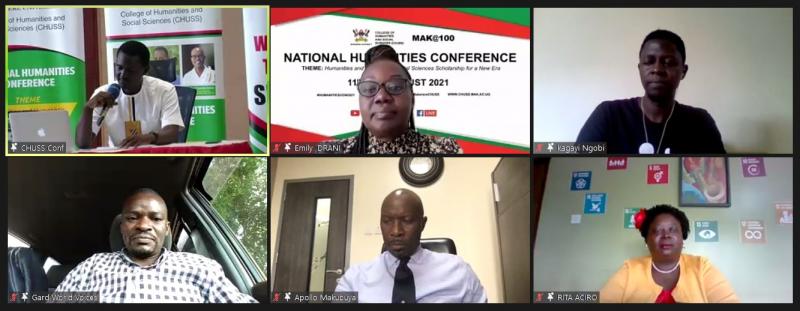
Highlights of the National Humanities Conference (HumanitiesCon2021), 11th-13th August 2021
Theme: “Humanities and Humanistic Social Sciences Scholarship for a New Era”
In many countries and universities across Africa and around the world, the humanities are deemed to be in crisis as they face a barrage of epistemic and ideological assaults from politicians, businesspeople and the general public. According to Prof. Paul Tiyambe Zeleza, Vice Chancellor, United States International University – Africa, Nairobi, Kenya, the critics of the humanities often centre on their purported lack of “usefulness” and apparent inability to offer employability skills to graduates. In much of Africa, the dismissal and devaluation of the humanities is exacerbated by the omniscient and omnipresent discourse of developmentalism. The humanities bear the brunt of the purported failures of African higher education to serve as the locomotive of sustainable development.
Addressing participants at the Opening Ceremony of the National Humanities Conference held on 11th August 2021, Prof. Tiyambe, underscored the relevance of the humanities and social sciences despite the continued attacks. In his keynote address titled “Rethinking the Place of Humanities and Social Sciences in the Post-COVID-19 Academy”, Prof. Tiyambe emphasized the strong linkage between the humanities and other branches of knowledge. “The pandemic and digitalization have underscored the necessity of the knowledge, skills, and literacies of the humanities. COVID-19 has not been confined to a crisis of physical health. It has also been a mental health crisis and a complex constellation of economic, social, cultural and political crises. Understanding the multidimensional nature and differentiated impact of the pandemic, devising effective containment strategies, and envisioning a better future requires the insights, imaginations and policies informed by the humanities and social sciences. Similarly, the transformations wrought by the Fourth Industrial Revolution are as much technological as they are social, and the rapidly changing jobs of the digitized economies of the 21st century require the  cultivation of technical skills as much as lifelong learning skills that the humanities and social sciences are renowned for. The liberal arts are priceless repositories of intrinsic, intellectual, and idealistic values, skills, and competences,” Prof. Tiyambe explained.
cultivation of technical skills as much as lifelong learning skills that the humanities and social sciences are renowned for. The liberal arts are priceless repositories of intrinsic, intellectual, and idealistic values, skills, and competences,” Prof. Tiyambe explained.
He called for interdisciplinarity as one of the measures to revitalize the humanities and social sciences, and make them more relevant to the concerns and interests of the contemporary world. “All too often, humanities faculty and disciplines are trapped in antiquarian disciplinary specializations and try to fiercely defend the antiquated Eurocentric disciplinary architecture of the 19th century. The history of ideas shows that massive transformations have taken place since then in the systems of knowledge production, dissemination, and organization determined by the demands and diversities of historical geography and the configurations of prevailing institutional, intellectual, and ideological dynamics. Interdisciplinarity offers a creative space between disciplines where new questions are asked, new approaches developed, new understanding advanced, and new fields and disciplines emerge. It connects disciplinary insights to address questions that transcend disciplinary boundaries and enhances the problem-solving capacities of scholarship,” he advised.
Held under the theme, “Humanities and Humanistic Social Sciences Scholarship for a New Era”, the National Humanities Conference (HumanitiesCon2021), organized by the College of Humanities and Social Sciences (CHUSS), was born out of the “Historicizing the Humanities at Makerere University since 1922 (Humanities@Mak100)” research project supported by the Andrew W. Mellon Foundation. The three-day virtual conference held on 11th-13th August 2021 and attended by humanities and social sciences scholars from across the region, aimed to centre debates and discussions on how the Humanities and Humanistic Social Sciences can critically grapple with challenges in the era of globalisation, decolonisation, technological advancement and novel global pandemics. It was part of the activities to mark 100 years of Makerere University .
.
KEYNOTE BY PROF. MONICA CHIBITA
In her keynote address titled, “Humanities and Social Sciences Research for the 21st century: Reclaiming Scholarly Agency”, Prof. Monica Chibita, Dean, Faculty of Journalism, Media and Communication at Uganda Christian University (UCU), Mukono decried the persistent demonization of the humanities despite their contribution to human and national development. “Many times humanities scholars are treated as second class citizens. Most of the training and research funding tends to flow away from the humanities and social sciences because their utility in the context of development needs is not immediately obvious,” she explained. She however urged humanities scholars not to turn into “perpetual mourners” but address the challenges head-on. “The 21st century offers opportunity for humanities to regain their position. Reinvigorating the humanities is critical for realizing this. We need to shed the label of mediocrity and lack of scholarly excellence within what we do. We should set criteria of rigour and hold each other accountable,” she advised.
REMARKS BY THE CHAIR, MAKERERE UNIVERSITY COUNCIL
Addressing participants, the Chair, Makerere University Council, also Guest of Honour, Mrs. Lorna Magara emphasized the symbiotic relationship between the humanities and natural sciences, saying the two cannot work in isolation.
“The world needs both the humanities and natural sciences. It is through social sciences that we can integrate the critical aspects of human development, identify the gaps and suggest necessary interventions. Social Sciences therefore inform the state of the required steps to achieve the desired human development targets,” she explained. She urged humanities scholars to target research relevant to societal needs and national development. Appreciating CHUSS Management and scholars for the renewed vigour in research, Mrs. Magara pledged more Council support  towards research and learning activities at the College.
towards research and learning activities at the College.
REMARKS BY THE VICE CHANCELLOR
In his remarks, the Vice Chancellor, Prof. Barnabas Nawangwe, commended CHUSS for the renewed vibrancy and contribution towards making Makerere a research-led University. “This conference is manifestation of the vibrant research taking place at CHUSS. The revitalized research and publication culture at CHUSS is commendable.”
Emphasizing the significance of the humanities and social sciences, the Vice Chancellor said no University is worth its name without the humanities. “The history of Makerere University is deeply rooted in the humanities, which have greatly contributed to the production of vital human resource in the country,” he said. He urged humanities and social sciences scholars to research more into Africa’s indigenous knowledge and values. Prof. Nawangwe appreciated the Government of Uganda for the support towards research and innovations at Makerere. Through the Makerere Research and Innovations Fund (Mak-RIF), the Government of Uganda is supporting over 500 research projects at Makerere University, and over 60 at the College of Humanities and Social Sciences. The Vice Chancellor also appreciated the Andrew W. Mellon Foundation in New York and Gerda Henkel Stiftung for the tremendous support towards scholarly activities at CHUSS.
LAUNCH OF MAWAZO
The conference featured the launch of the twin MAWAZO publication by the First Deputy Vice Chancellor in charge of Academic Affairs, Dr Umar Kakumba. Addressing participants, Prof. Kakumba applauded CHUSS for the renewed vibrancy in research and publication. “For the last two years, CHUSS has been on the move. It is with great honour that I launch the twin MAWAZO publication. With great history as one of the first publications of Makerere, first released in 1967, the MAWAZO journal publication has enabled us to promote Pan-Africanism and contribute to policy development.” In his closing remarks, Dr Kakumba noted that the conference had presented an opportunity for Senate to reflect on decisions on humanities and social sciences scholarship at Makerere University. “The conference has epitomized the position of CHUSS. There is need to rethink strategies on how to reposition the humanities. Society cannot grow without the human side of enterprise,” he explained.
PANEL OF EXPERTS
The event also featured a discussion on the significance of the humanities by a panel of experts namely; Ms. Emily Drani, former Executive Director of the Cross-Cultural Foundation of Uganda; Owek. Apollo Nelson Makubuya, former Attorney General of Buganda Kingdom and Corporate Lawyer; Mr. Peter Kagayi Ngobi, Performing Poet, Writer, Publisher and Lawyer; Ms. Rita Aciro Lakor, Women Rights Activist and Executive Director Uganda Women’s Network; and Mr. Gard Benda, Founder and Country Director World Voices Uganda. The discussion was moderated by Dr. Jimmy Spire Sssentongo, Lecturer in the Department of Philosophy at Makerere University. In their submissions, the panelists further reiterated the significance of the humanities and social sciences. In his remarks, Owek. Apollo Makubuya emphasized the interplay between the humanities and natural sciences. “Much as the sciences are very important, addressing most of the challenges affecting our societies like poverty, underdevelopment, lack of democracy, corruption and conflicts requires knowledge and skills of the humanities. It is wrong to create a dichotomy between the natural sciences and humanities," he noted. In her submission, Ms. Drani argued that the humanities were not being prioritized because “they do not come with economic currency”. “Most of our problems are social development challenges. It is therefore very irresponsible to promote sciences, while neglecting the humanities. Sciences are important but rely on humanities to define what society is,” she said. Ms. Rita Aciro Lakor explained that the humanities foster critical thinking, an aspect key for nation building. “The reason there is too much resistance against the humanities is because they foster critical thinking skills that challenge power,” she argued.
In a bid to revitalize the humanities, the experts called for flexibility in teaching. “Teaching of the humanities should match the changing dynamics. It should be aligned to address contemporary issues. Let us embrace the challenge and work towards making ourselves relevant,” they noted.
In her remarks, the Principal of CHUSS, Dr. Josephine Ahikire said the 2021conference was part of the efforts to galvanise humanities scholarship for greater human utility especially on the African continent. “No social solution can be achieved without humanitarian research. As humanity continues to grapple with challenges such as climate change, terrorism, mass migration and pandemics, there is need for more ingenuity and inventiveness. We need to revalidate indigenous knowledge that is important for identity construction and existence,” she noted. She appreciated Makerere University Council and Management for the great stewardship and support towards CHUSS programmes. “With the support, CHUSS has been able to expand its horizon.” Like the Vice Chancellor, she also appreciated the Government of Uganda, the Andrew W. Mellon Foundation and Gerda Henkel Stiftung for the unwavering support towards research and academic training programmes at CHUSS.
The event was convened by Dr Levis Mugumya, Coordinator of the Historicizing the Humanities at Makerere University since 1922 (Humanities@Mak100) research project. It was coordinated by Dr Aisha Nakiwala, Head, Department of Journalism and Communication, also Chair,  Scientific Committee, and Dr Edgar Nabutanyi, Coordinator of the Andrew W. Mellon Foundation and Gerda Henkel Stiftung projects at CHUSS.
Scientific Committee, and Dr Edgar Nabutanyi, Coordinator of the Andrew W. Mellon Foundation and Gerda Henkel Stiftung projects at CHUSS.
CONFERENCE PRESENTATIONS
- Historicization of the Humanities at Makerere University
- Nationalism, Ethnic Identity and Politics
- The Covid-19 Disruption(s)
- Humanities, Pedagogies and Curricula
- Mental Health and Wellbeing
- Humanities and the Decolonisation Project
- Feminism, Gender and Sexuality
- CHUSS Tracer Study
- Humanities, Governance and the Law
- Humanities in the Digital Era
- Literary and Popular Cultures
- Language and Translation
- Indigenous Knowledge
- Archives, Heritage and Cultural Memory
- and Humanities and Contemporary Development Challenges
PANEL DISCUSSIONS
- Digital Natives and Digital Migrants
- Rethinking Strategies for Ending Sexual Harassment in Higher Education Institutions in Uganda
- Remaking People and Societies
- and An Exploration of an Oeuvre and Legacy
Related links
1. https://news.mak.ac.ug/2021/08/humanitiescon2021-underscores-symbiosis-b...
2. http://chuss.mak.ac.ug/events/invitation-participate-national-humanities...
4. https://chimpreports.com/humanities-social-sciences-vital-in-higher-education-researchers/
5. UBC bulletin on Conference - https://youtu.be/aI3KIjoymsw
6. Link to NTV talk-show - https://www.youtube.com/watch?v=yAZfZ2u8TLI
